Reply To:
Name - Reply Comment
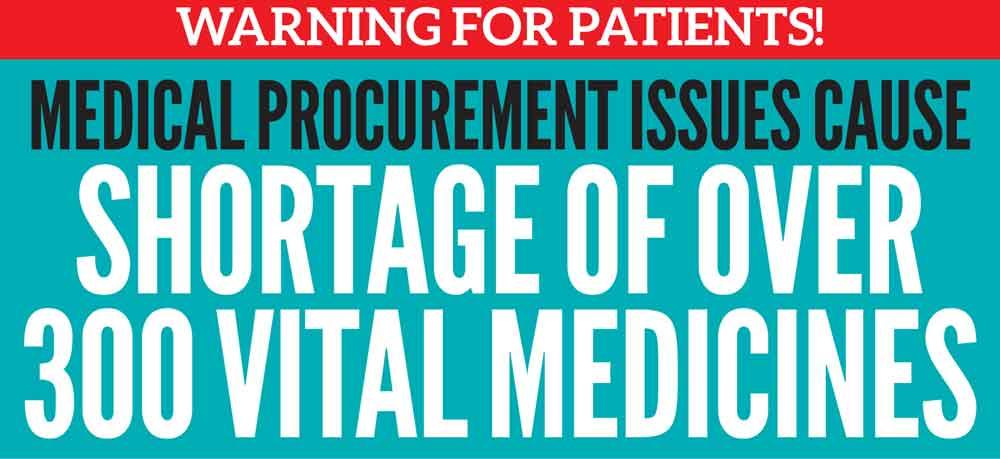
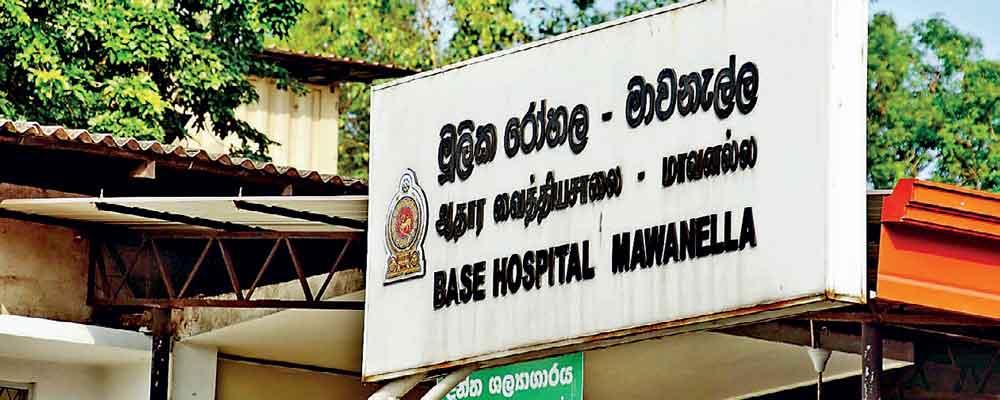
Hospital sources have confirmed that the lack of sodium bicarbonate at the Mawanella Base Hospital has contributed to the deaths of approximately five patients
Pics by Waruna Wanniarachchi
|
A notable example is the Mawanella Base Hospital, which is Hospital sources confirmed that this medication hasn’t been imported into the country for a considerable period |
 Hospital sources across the island have confirmed a severe shortage of medicines in many hospitals in the country. This situation has caused much inconvenience to numerous patients. A notable example is the Mawanella Base Hospital, which is currently facing a shortage of sodium bicarbonate—a medication used to restore breathing in patients with kidney disease, diabetes and high blood pressure. Reports indicate that there were instances of five patients having died at the time this article was being penned.
Hospital sources across the island have confirmed a severe shortage of medicines in many hospitals in the country. This situation has caused much inconvenience to numerous patients. A notable example is the Mawanella Base Hospital, which is currently facing a shortage of sodium bicarbonate—a medication used to restore breathing in patients with kidney disease, diabetes and high blood pressure. Reports indicate that there were instances of five patients having died at the time this article was being penned.
However, hospital sources confirmed that only one death was attributable to the lack of this medication. Sodium bicarbonate is administered to patients with conditions like kidney disease, high blood pressure, and diabetes. These patients experience difficulty in breathing, followed by increased acidity in the body. This leads to severe discomfort in the patient, and sodium bicarbonate is used to stabilise the patient’s condition. Although sodium bicarbonate may not be a complex drug, it is a critical medication.
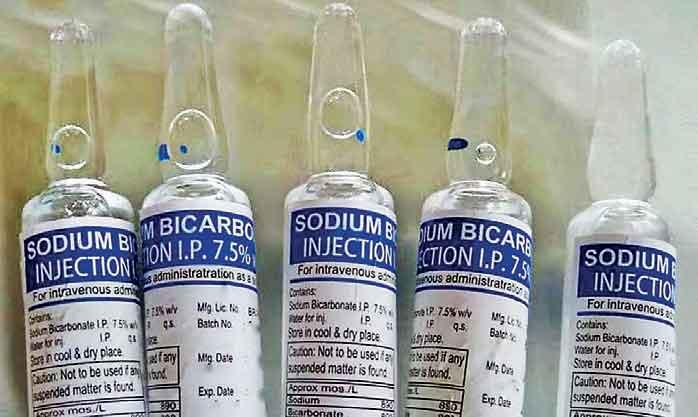
Ministry of Health has failed to accurately forecast and manage the medical supply chain, leading to the current shortage of critical medicines such as sodium bicarbonate
Currently, sodium bicarbonate is unavailable in hospitals across Sri Lanka and cannot be purchased through private pharmacies. When a government hospital experiences a shortage of medicine, the standard procedure is to check its availability in other hospitals. If found, the medicine is transferred from the relevant hospital. If that medicine is not available in any of the government hospitals, it can be sourced from private pharmacies. In that case it is procured through the Medical Supplies Division in Colombo. However, the sodium bicarbonate is presently unavailable in private pharmacies as well, as it hasn’t been supplied anywhere in Sri Lanka. Hospital sources confirmed that this medication hasn’t been imported into the country for a considerable period.
Deficiencies in the tender process
The primary reason for the shortage of sodium bicarbonate is issues related to the quality of drugs imported into the country. Tenders to import substandard drugs were canceled and health authorities have since failed to reissue tenders or invite bids to import essential medicines. This failure has led to the current shortage of sodium bicarbonate in hospitals across Sri Lanka. The shortage of medicines in the country stems from deficiencies in the tender process for drug imports. While the current authorities have the capacity to take prompt action, it appears they have yet to implement an effective system to address the issue. Health Ministry sources allege that officials accused of drug-related frauds along with a former Health Minister, who stirred up much controversy, continue to be involved in the drug import process. These allegations suggest that these officials are not taking the necessary steps to establish a proper system for importing medicines.
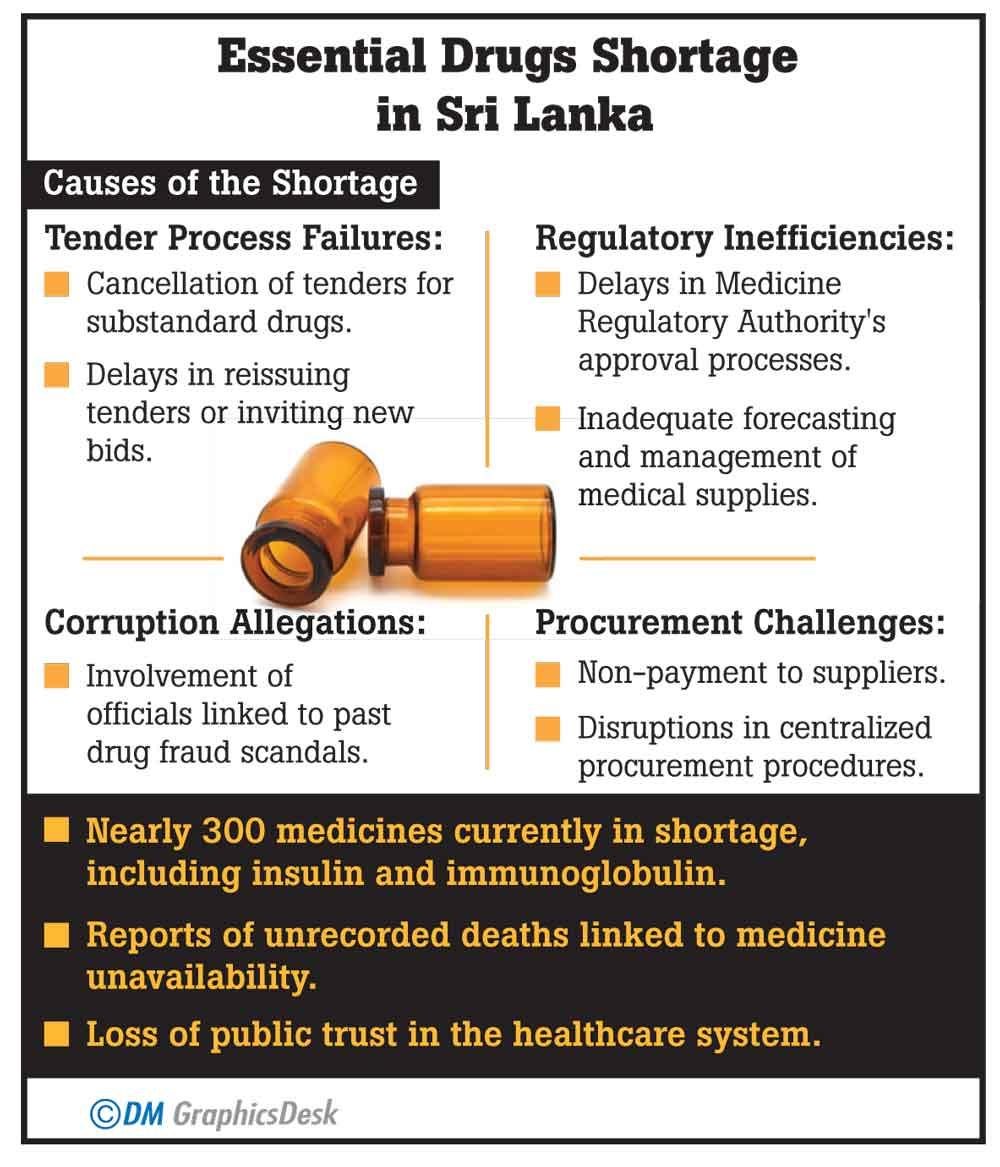
As a result, there is a shortage of several medicines in government hospitals; the shortage included immunoglobulin, sodium bicarbonate, and insulin. Former Health Secretary Janaka Chandragupta faced allegations of being involved in substandard medicine frauds during the tenure of former Health Minister Keheliya Rambukwella. However, no stern action has been taken regarding the copies of the letters he issued concerning substandard medicines. Additionally, key officials implicated in the drug fraud—such as the Director General of Health Services and senior officers from the Ministry of Health, the Medical Supplies Division, the State Pharmaceuticals Corporation, and the National Medicine Regulatory Authority —remain in their positions. This has contributed to the ongoing shortage of medicines and the inability to provide quality pharmaceuticals to the public. Specialist Dr. Chamal Sanjeewa said that this situation poses a significant barrier to rebuilding public trust in the future of the health system.
During the tenure of the former Minister of Health, many lives were lost due to the administration of substandard medicines. Despite their denial of importing such medicines during media conferences at the time, the health officials responsible remain in their positions. Dr. Chamal Sanjeewa added that as long as these individuals retain their positions, providing quality medicines to the public would remain a significant challenge.
The senior officials in the Ministry of Health failed to accurately forecast and manage the medical supply chain, leading to the current shortage of critical medicines such as sodium bicarbonate, immunoglobulin and insulin. Dr. Sanjeewa said, “The country’s health system is already in a state of crisis, and this situation is expected to deteriorate further in the coming year. It is the responsibility of the new Minister of Health to launch a comprehensive investigation into these issues”.
According to data from the Medical Supplies Division, nearly 300 medicines are currently in shortage. The Ministry of Health has disrupted the medicine procurement process of the medical supplies system by promoting regional purchases in the past. This questionable practice resulted in substantial daily financial losses for the country. To address this, the process of ordering medicines at lower prices through proper procurement procedures must be reinstated immediately. Dr. Chamal Sanjeewa also called for the removal of certain officials who are obstructing this process.
Hospitals across Sri Lanka are reporting shortages of medicines, including sodium bicarbonate for patients with kidney problems and other serious conditions when acidosis occurs, insulin for diabetic patients, and immunoglobulins for individuals with immune deficiencies. These shortages have persisted for some time; contributing to numerous unreported deaths.
Primary cause of medicine shortage
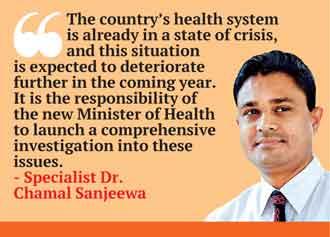 According to sources, currently, the procurement process for importing medicines is not functioning effectively. Many companies interested in importing medicines are still awaiting registration approval. This delay is attributed to weaknesses in the Medicine Regulatory Authority’s procurement procedures. Some companies involved in the procurement process lack the necessary registration to import medicines into Sri Lanka. Meanwhile, other companies which expect to import medicines are hindered by an incomplete registration process; this situation further exacerbating the shortage. The inefficiency of the four institutions—the Ministry of Health, the Medicine Regulatory Authority, the Medical Supplies Division, and the State Pharmaceutical Corporation—has been identified as a primary cause of the medicine shortage. The actions and procedures of certain officers within these institutions have also directly contributed to the issue. It is estimated that resolving the shortage would take approximately six months, provided the procurement process for producing these medicines is initiated immediately. This is due to the fact that medicines can only be manufactured after the awarding of relevant tenders. Delays in addressing the procurement process will severely impact patients, according to Dr. Sanjeewa.
According to sources, currently, the procurement process for importing medicines is not functioning effectively. Many companies interested in importing medicines are still awaiting registration approval. This delay is attributed to weaknesses in the Medicine Regulatory Authority’s procurement procedures. Some companies involved in the procurement process lack the necessary registration to import medicines into Sri Lanka. Meanwhile, other companies which expect to import medicines are hindered by an incomplete registration process; this situation further exacerbating the shortage. The inefficiency of the four institutions—the Ministry of Health, the Medicine Regulatory Authority, the Medical Supplies Division, and the State Pharmaceutical Corporation—has been identified as a primary cause of the medicine shortage. The actions and procedures of certain officers within these institutions have also directly contributed to the issue. It is estimated that resolving the shortage would take approximately six months, provided the procurement process for producing these medicines is initiated immediately. This is due to the fact that medicines can only be manufactured after the awarding of relevant tenders. Delays in addressing the procurement process will severely impact patients, according to Dr. Sanjeewa.
Hospital sources have confirmed that the lack of sodium bicarbonate at the Mawanella Base Hospital has contributed to the deaths of approximately five patients. This issue sparked a heated discussion last week. On December 1 (Sunday), a patient in the intensive care unit of the Thambuththegama Hospital required sodium bicarbonate. Reports indicate that the hospital sought assistance from all hospitals across Sri Lanka, but was unable to locate any supply of the drug. At the time of writing, there was news of the patient having breathed his last.
Controversy regarding reasons for deaths
Despite these incidents, the death certificates for the patients at the Mawanella Base Hospital do not explicitly attribute the fatalities to the lack of sodium bicarbonate. Instead, the cause of death is recorded as a worsening of the patients’ conditions, according to a hospital spokesperson. He confirmed that at least two of the deaths were directly due to the unavailability of the drug, though the families of the deceased remain unaware of such details. Mawanella Base Hospital has been without sodium bicarbonate since last April. It was revealed that following media reports of deaths linked to the lack of sodium bicarbonate, Sabaragamuwa Provincial Health Director has initiated an investigation. The hospital’s pharmaceutical unit had submitted an application to the Medical Supplies Division in April, requesting 50 sodium bicarbonate injections. However, the Medical Supplies Division was unable to fulfill the request due to a depleted stock. Although the pharmaceutical unit at the Mawanella Base Hospital expressed readiness to procure the injections from the private sector, it was found that the private sector also did not have adequate supplies.
The Sabaragamuwa Provincial Health Director managed to provide nine doses of sodium bicarbonate to the Mawanella Base Hospital. These doses were sourced by collecting remaining stock from hospitals in Balangoda and Kahawatta within the Ratnapura District to address the needs of patients receiving treatment. Hospital sources indicated that the Mawanella Base Hospital last received 30 doses of sodium bicarbonate on April 3rd. A hospital spokesperson confirmed that this quantity was insufficient to meet the hospital’s needs between April and November.
The Pharmaceutical Unit of the Mawanella Base Hospital has been authorised to procure sodium bicarbonate from the private sector, as the Medical Supplies Division doesn’t have stocks of this medicine. However, according to the hospital spokesperson, that drug is not available even in the private sector. The spokesperson further noted that the company responsible for supplying the drug has confirmed its unavailability. Information was received that the shortage may stem from either non-payment to the importing company or an issue with the tender process for importing the drug, according to the spokesperson.
When inquired about the situation, the Acting Director of the Mawanella Base Hospital, Dr. Hirantha Wijesinghe, said the following: “We will not provide any information regarding patients dying due to the lack of sodium bicarbonate. You should direct your inquiries to the Kegalle District Health Director or the Provincial Health Director. We cannot disclose any details about that. I do not have the Health Director’s contact number, nor will I provide it. I will not reveal the name either. You will need to go there, locate him, and speak to him.”
When this newspaper inquired about these matters, the Provincial Health Director of Sabaragamuwa Province, Dr. Kapila Kannangara, confirmed that sodium bicarbonate had been unavailable at the Mawanella Base Hospital for six months. He stated that only one patient had died during this period due to the lack of the drug. “It cannot be conclusively said that the patient died solely because the medicine was unavailable. The doctors said that if sodium bicarbonate had been available, the patient might have survived for a little longer. This medicine has been unavailable in the hospital for six months. It was also unavailable outside. Following an investigation into the matter, nine doses were sourced from hospitals such as Ratnapura and Kahawatta. It was said that 5,000 doses of sodium bicarbonate had recently been received at the Colombo drug store, and a portion of this stock would be allocated to us, which should help resolve the issue,” he added.
To inquire further, this newspaper contacted the National Medicine Regulatory Authority. While we were unable to reach the CEO, Saween Hemage, the director of the institution responded, directing us to contact the Medical Supplies Division or the State Pharmaceuticals Corporation to obtain details regarding the shortage and the failure to import the drug.
This newspaper then attempted to contact the Deputy Director General of the Medical Supplies Division, Dr. G. Wijesuriya, for a clarification on the matter. However, he was unavailable for comment. Despite several efforts to reach him, he stated that he was unable to provide answers as he was attending a tender meeting. Recently, however, Dr. Wijesuriya had informed the media that a stock of sodium bicarbonate sufficient for three months had arrived at the Colombo Port and these supplies would be distributed to hospitals shortly.
This newspaper also attempted to reach the Minister of Health and Mass Media Dr. Nalinda Jayatissa for his comments on the issue, but he was unavailable for comments.